重点句型1-3翻译与背诵(1)
中考英语人教版七年级下册Units1-3词汇背诵

Unit1--3重点短语1.play chess下国际象棋2. speak English说英语3. play the guitar弹吉他4. play the drums敲鼓5.get up 起床6.play the violin 小提琴7. play the piano弹钢琴8.join the swimming club 加入游泳俱乐部9. be good at 擅长=do well in 10.tell stories= tell a story 讲故事11.help(sb)with 在---帮助(某人)12.在运动方面提供帮助help with sports13be good with 擅于和---相处14.talk to / with 和--交谈15. on the weekend 在周末=on weekends16.help sb to do sth.帮助某人做某事17..English-speaking students 说英语的学生18. work at在---工作19.向某人展示某物show sb sth = show sth to sb 20.students wanted 招聘学生21.get dressed 穿好衣22.take a shower洗澡23. from --to --从---到--24. be late for迟到起得晚get up late25. at night 在晚上在早晨/下午/晚上in the morning/afternoon /evening26.go to work 去上班27. go to bed 去睡觉28. go home 回家29.on school days 在上课日30. on weekends=on the weekend在周末31.take a walk 散步=go for a walk32. either ---or ---或者---或者---33.for half an hour 半小时34. get home 到家35. 什么时候what time36.一刻钟a quarter 37. 许多lots of =a lot of 38. 尝起来很好taste good39.have a healthy life过着健康的生活40. 做早餐make breakfast/lunch/dinner41.到…时候了it’s time for sth =It’s time to do sthEg : It’s time for breakfast = It’s time to have breakfast到某人做某事的时候了It’s time for sb to do sth It’s time for us to have lunch有时间做某事have time to do stheg: I have time to play the piano42.对…有好处be good foreg: Vegetables are good for us .对…有害be bad for擅长做某事be good at = do well inHe is good at dancing= He does well in dancing . be good with sb 善于应对某人They are good with old people. 43.7:45 a quarter to eight 7:15 a quarter past seven 44.多远how far多长时间how long 45.居住在某地live in46. 乘地铁take the subway = by subway 47. 骑自行车ride the bike =by bike .48.在……和……之间between…and49 . 实现come true 50.远离far from51.一个11岁的男孩an eleven-year-old boy 52.认为;想起think of53. 步行去… walk to …= go to …on foot 54. 害怕做某事be afraid to do sth 害怕某物/人be afraid of sth55.(给某人)写邮件write an e-mail to sb56. (某人)需要多长时间做某事sb need (s) some time to do sth57. 开某人的车drive one’s car58.感谢thanks for = thank sb for59.公交车站bus stop/station60.到达get to = arrive in +地点= reach +地点61. have a good day 玩得高兴62.对某人来说像… be like …to sb 重点句型1.我们需要你在运动方面来帮助说英语的学生。
七年级英语新目标上1 4单元短语,句型,语法

七年级英语新目标上1 4单元短语,句型,语法七年级英语新目标上1-4单元短语,句型,语法七年级上学期期中复习(背诵)一trained篇;重点句型1goodmorning/afternoon/evening.goodmorning/afternoon/evening.早上/下午/晚上好!2howareyou?你好吗?i’mfine,/ok,thanks.fine,thanks.很好,谢谢你.3what’sthisinenglish?这个用英语怎么说?it’samap.它就是一张地图.it’sv.它就是字母v.spellitplease.请拼一下。
k-e-y.4whatcolorisit/thekey?它什么颜色?it’sblue.它是蓝色thekeyisyellow.钥匙是黄色,5hello,frank.你好!弗兰克。
hello/hi,eric.你好,埃瑞克unit1mynameisgina.重点句型1what’syourname?你叫做什么名?mynameisjenny.我叫做詹妮。
=i’mjenny./jenny.2nicetomeetyou.见到你很高兴。
nicetomeetyou,too.3what’shisname?他叫做什么名?hisnameisjenny.他叫做詹妮。
he’sjenny.4what’shername?hernameislinda.她的名字叫琳达。
she’slinda.5what’syourfirstname?你的名是什么?myfirstnameisjack.我的名字就是杰克。
=jack.6what’syourlast/familyname?你的姓什么?mylast/familynameisgreen.=it’sgreen.我的姓氏就是格林。
7what’syour/his/herphonenumber?你的电话号码就是什么?my/his/herphonenumberis234-4567./it’s281-9176.我的电话吗是。
全国英语等级考试三级句型学习资料汇总
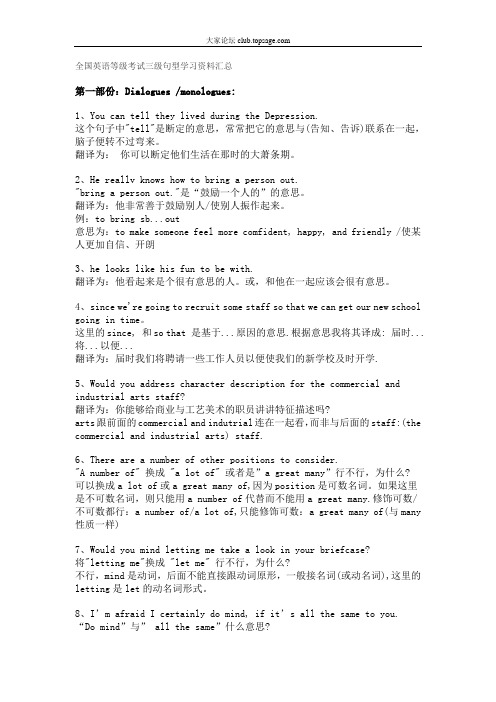
全国英语等级考试三级句型学习资料汇总第一部份:Dialogues /monologues:1、You can tell they lived during the Depression.这个句子中"tell"是断定的意思,常常把它的意思与(告知、告诉)联系在一起,脑子便转不过弯来。
翻译为:你可以断定他们生活在那时的大萧条期。
2、He reallv knows how to bring a person out."bring a person out."是“鼓励一个人的”的意思。
翻译为:他非常善于鼓励别人/使别人振作起来。
例:to bring sb...out意思为:to make someone feel more comfident, happy, and friendly /使某人更加自信、开朗3、he looks like his fun to be with.翻译为:他看起来是个很有意思的人。
或,和他在一起应该会很有意思。
4、since we're going to recruit some staff so that we can get our new school going in time。
这里的since, 和so that 是基于...原因的意思.根据意思我将其译成: 届时...将...以便...翻译为:届时我们将聘请一些工作人员以便使我们的新学校及时开学.5、Would you address character description for the commercial and industrial arts staff?翻译为:你能够给商业与工艺美术的职员讲讲特征描述吗?arts跟前面的commercial and indutrial连在一起看,而非与后面的staff:(the commercial and industrial arts) staff.6、There are a number of other positions to consider."A number of" 换成 "a lot of" 或者是”a great many”行不行,为什么? 可以换成a lot of或a great many of,因为position是可数名词。
新版人教版新目标英语unit1-3(第一、二、三单元)重点语法、句型

Unit 1 My name’s Gina.1.学会介绍人的名字:a.介绍自己:My name is ... .或者:I am ... .意思是:我名叫...;我是...。
(其中name is和I am还可缩写为:name’s和I’m )例句:My name’s Bob.或者:I’m Bob.b.介绍女的:Her name is ... .或者:She is ... . 意思是:她名叫...;她是...。
(其中she is可缩写为:she’s)例句:Her name’s Mary. 或者:She’s Mary.c.介绍男的:His name is ... .或者:He is ... . 意思是:他名叫...;他是...。
(其中he is可缩写为:he’s)例句:His name’s Jack.或者:He’s Jack.▲易考题型:同义句例如:①My name’s Bob.(写同义句)I’m Bob.②Her name’s Mary.(写同义句)She’s Mary.③His name’s Jack.(写同义句)He’s Jack.2.学会询问人的名字:a.问对方的名字:What is your name? 意思是:你叫什么名字?(其中what is可缩写为what’s)例句:----What’s your name? 你叫什么名字?----My name’s Cindy. (或者:I’m Cindy.)我叫辛迪。
b.问女的名字:What’s her name? 意思是:她叫什么名字?例句:----What’s her name? 她叫什么名字?----Her name’s Mary. (或者:She’s Mary.)她叫玛丽。
c.问男的名字:What’s his name? 意思是:他叫什么名字?例句:----What’s his name? 他叫什么名字?----His name’s Jack. (或者:He’s Jack. )他叫杰克。
五年级英语上册1-3重点句型总结与练习

五年级英语上册重点句型总结与练习Unit1 What’s he like?询问某人外貌特征或性格特点的句型1.What’s +主语(第三人称单数)+like? “某人什么样?”He/She/Wu Yifan is +表示外貌特征或性格特点的形容词. 例:What’s Miss Chen like?She is kind.2.Be动词+主语+表示外貌特征或性格特点的形容词?肯定回答:Yes, 主语+be动词.否定回答:No, 主语+be动词+not.例:Is your Chinese teacher strict?Yes, she is.练一练,我会做!1._Who’s_ your music teacher? ---Miss White.2. _What’s_ your English teacher like ?---She is kind and funny.3.I __am___ helpful. (be)4.The girl___is__ polite. (be)5.They _are__ hard-working. (be)5.He is very funny. (改写成一般疑问句)Is he very funny?7. Mr Gao is our Chinese teacher. (改写成否定句)Mr Gao isn’t our Chinese teacher.8. Is he old ? ( 作否定回答)No, he isn’t.9.She’s thin and tall. (就划线部分提问)What’s she like?10.我们的数学老师很严厉。
(翻译)Our maths teacher is strict.Unit2 My week1.询问今天星期几:What day is it today?It is +星期(Monday, Tuesday...)2.询问你在星期几有什么课的句型:What do you have on +星期名称?I / We have +课程名称.例:What do you have on Mondays?I have Chinese, maths and English.3.询问对方“经常做某事吗”的句型:Do you often +动词原形+其他(时间状语/地点状语)?肯定回答:Yes, I do.否定回答:No, I don’t.例:Do you often play the pipa on the weekend?No, I don’t.4.询问你经常做什么的句型:What do you often +do+其他(时间状语/地点状语)?I/We often...例:What do you often do on the weekend?I/We often read books.练一练,我会做!1.What do you have on Thursdays?I have Chinese and English.2.Do you often listen to music on the weekend? Yes, I do. / No, I don’t.3. What do you often do on the weekend?I often play ping-pong.4.I have art, maths and music on Tuesdays.(就划线部分提问)What do you have on Tuesdays?5.I often read books in this park.(改为一般疑问句)Do you often read books in this park?6.Do you often play football on the weekend?(作否定回答)No, I don’t.7.What day is it today?(就实际情况回答)It’s T hursday.Unit3 What would you like?1.询问对方想吃什么的句型:What would you like to eat?an apple.①I’d like a hamburger, please.some sandwich es, please.②A sandwich, please.2.询问对方想喝什么的句型:What would you like to drink?I’d like some tea.3.询问对方最喜欢的东西(食物/课程......)的句型?What’s your favourite food?①食物名称.② I love +食物名称.③My favourite food is+食物名称.例:What’s your favourite food?Noodles. / I love noodles. / My favourite food is noodles.4.描述食物的味道的句型:主语+be动词+表示食物味道的形容词.例:It is sweet.The vegetables are healthy.They’re delicious.练一练,我会做!1.What would you like to eat ?I’d like a sandwich, please.2.What would you like to drink ?I’d like some water, please.3.It is hot.(be)4.The vegetables are delicious.(be)5.They are fresh.(be)6.I’d like some hamburgers .(hamburger)7.What is your favourite food?----Salad.。
高考重点句型归纳

A. should have arrived
B. should arrive
C. should have had arrived
D. should be arriving
He _____ have completed his work; otherwise, he wouldn’t be enjoying himself by the seaside.(2005北京)
There is no harm in using the environmentally friendly products. 用环保产品是没有害处的。
4) There is no/some difficulty/trouble (in) doing sth
例:There is no trouble in selling our car.
A. has
B. had
C. will have D. had had
10.情态动词+动词不定式完成结构的用法
could have done “本来可以……”
might have done “本来可能……;
should/ought to have done “本来该做某事” (而实际未做)
should not/ought not to have done “本来不该 做”(实际却做过了,含有责备语气)
I wished I live in Beijing.
I failed in the maths exam. How I wish I hadn’t wasted so much time playing!
How I wish every family _____ a
large house with a beautiful garden!(2003上海春季)
人教版英语七年级上册预备单元1-3单元翻译句子、句型转换(含答案)

人教版英语七年级上册预备单元1-3单元翻译句子、句型转换(含答案)一、翻译句子。
Unit 1 Good morning !1、早上好,爱丽丝. ___________ ____________ , Dale.2、下午好,陈老师。
____________ ___________ , Miss Chen.3、晚上好,鲍勃。
____________ ___________ , Bob.4、你好,弗兰克。
_________ \ __________ , Frank5、戴尔,你好吗?__________ _________ __________ , Dale?6、我很好,谢谢。
I’m ___________ , ___________ __________ \ _________7、你好。
__________ do you __________.8、Tom好吗?__________ __________ Tom ?9、他们好吗?_________ __________ they?Unit 2 What’s this in English?1、这个用英语怎么讲?\ 这个用英语如何表达)?__________ this __________ ___________ ?或者__________ ___________ this __________ ___________ ?2、那是什么?__________ ___________ ? 或者_________ _______________?3、这是什么?__________ ____________ ? = What is this ?4、它是一个橘子。
________ _________ __________ orange.5、它是一件夹克衫。
________ _________ a jacket. =__________ a jacket.6、那个用英语怎么说?\ 那个用英语怎么表达?What’s __________ in ___________ ? = What _________ _________ __________ English?7、请拼写它。
Units 1 - 3 背诵内容 考试用

八年级上Units 1 ~ 31.wonder(v.&n.)→(adj.)极好的2.bore(adj.)→(adj.)无聊的;令人厌烦的→(adj.)厌倦的;烦闷的3.enjoy(v.)→(adj.)有乐趣的;令人愉快的4.activity(n.)→(pl.)活动5.decide(v.)→(n.)决定;决心6.build(v.)→(n.)建筑物7.trade(n.&v.)→(n.)商人8.differ(v.)→(n.)不同;差异;区别→(adj.)不同的9.wait(v.)→(n.)男服务员;侍者→(n.)女服务员10.hunger(n.)→(adj.)饥饿的11.like(v.&n.)→(反义词)不喜爱(的事物);厌恶(的事物)12.two(num.)→(adv.)两次;两倍13.swing(v.)→(过去式)→(过去分词)→(现在分词)摇摆,摆动14.break→(过去式)→(过去分词)(使)破;裂;碎;损坏15.health(n.)→(adj.)健康的;强健的→(adv.)健康地16.die(v.)→(n.)死;死亡→(adj.)死的→(现在分词) 17.write(v.)→(过去式)→(过去分词)书写;写→(n.)作者;作家18.little(adj.)→(比较级)较少的;更少的→(最高级)最少的;最小的19.much/many(adj.)→(比较级)更多(的)→(最高级)最多;大多数20.loud(adj.)→(adv.)喧闹地;大声地;响亮地21.quiet(adj.)→(adv.)轻声地;轻柔地;安静地pete(v.)→(n.)比赛;竞赛;竞争23.clear(adj.)→(adv.)清楚地;清晰地;明白地24.win(v.)→(过去式/过去分词)赢;获胜;赢得→(n.)获胜者;赢家25.talent(n.)→(adj.)有才能的;能干的26.say(v.)→(n.)谚语;格言重点短语1.去度假2.照相3.待在家里4.购物5.相当多;不少6.当然;自然7.给……的感觉;感受到8.因为9.几乎从不10.一月一次11.至少12.少于13.多于14.例如15.只要;既然16.关心;在意17.与……不同;与……有差异18.使显现;使表现出19.事实上;实际上20.和……相同;与……一致重点句型1.I just stayed at home most of the time _________ and ________.我大部分时间只是待在家里读书、休息。
七年级重点句型翻译练习(教师版)

七年级重点句型翻译练习(教师版)本页仅作为文档页封面,使用时可以删除This document is for reference only-rar21year.March七八年级重点句型翻译练习(教师版)七年级上Unit 1-21.那个女孩擅长画画。
The girl is good at painting.2.女演员正站在舞台的中央。
The actress is standing at the center of the stage.3.你一般几点钟上学?What time do you usually go to school?4.孙中山先生为全世界的人所熟悉。
Dr. Sun Yat-sen is well-known to everyone from all over the world.5.林丹是世界上最好的羽毛球运动员之一。
Lin Dan is one of the best badminton players in the world.6.你愿意和我们一起去钓鱼吗?Would you like to go fishing with us?Do you want to go fishing with us?7.安娜想和中国的年轻人做朋友。
Anna wants to make friend s with young people in China.8.我住在一座靠近湖泊的房子里。
I live in a house close to / near a lake.9.你昨天什么时候到达电影院的?When did you arrive at the cinema yesterday?10.我妈妈每天都忙于工作。
My mum is busy with her work every day.My mum is busy work ing every day.11.她上学从不迟到。
She is never late for school.12.玛丽每天都骑自行车上学吗?Does Mary go to school by bike every dayDoes Mary ride to school every day?13.他每周去两次图书馆。
初中英语重点句型
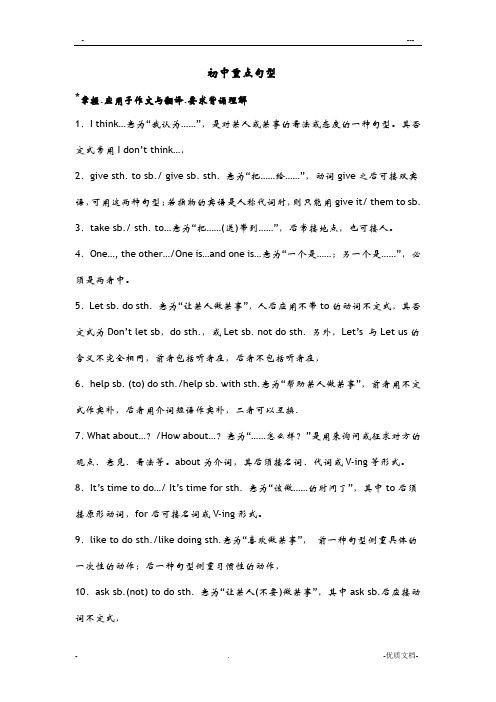
初中重点句型*掌握.应用于作文与翻译.要求背诵理解1.I think…意为“我认为……”,是对某人或某事的看法或态度的一种句型。
其否定式常用I don’t think…,2.give sth. to sb./ give sb. sth. 意为“把……给……”,动词give之后可接双宾语,可用这两种句型;若指物的宾语是人称代词时,则只能用give it/ them to sb. 3.take sb./ sth. to…意为“把……(送)带到……”,后常接地点,也可接人。
4.One…, the other…/One is…and one is…意为“一个是……;另一个是……”,必须是两者中。
5.Let sb. do sth. 意为“让某人做某事”,人后应用不带to的动词不定式,其否定式为Don’t let sb,do sth.,或Let sb. not do sth. 另外,Let’s 与Let us的含义不完全相同,前者包括听者在,后者不包括听者在,6.help sb. (to) do sth./help sb. with sth.意为“帮助某人做某事”,前者用不定式作宾补,后者用介词短语作宾补,二者可以互换.7.What about…?/How about…?意为“……怎么样?”是用来询问或征求对方的观点、意见、看法等。
about为介词,其后须接名词、代词或V-ing等形式。
8.It’s time to do…/ It’s time for sth. 意为“该做……的时间了”,其中to后须接原形动词,for后可接名词或V-ing形式。
9.like to do sth./like doing sth.意为“喜欢做某事”,前一种句型侧重具体的一次性的动作;后一种句型侧重习惯性的动作,10.ask sb.(not) to do sth. 意为“让某人(不要)做某事”,其中ask sb.后应接动词不定式,11.show sb. sth. / show sth. to do. 意为“把某物给某人看”,该句型的用法同前面第2点。
中考翻译系列--重点句型+一词多义+各册短语
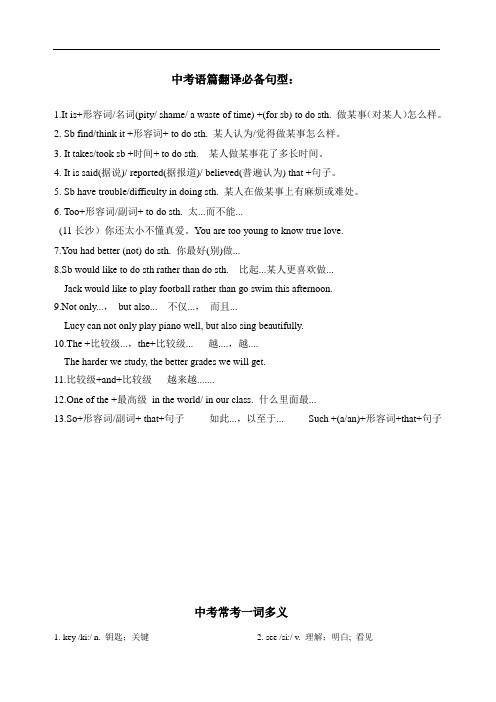
中考语篇翻译必备句型:1.It is+形容词/名词(pity/ shame/ a waste of time) +(for sb) to do sth. 做某事(对某人)怎么样。
2. Sb find/think it +形容词+ to do sth. 某人认为/觉得做某事怎么样。
3. It takes/took sb +时间+ to do sth. 某人做某事花了多长时间。
4. It is said(据说)/ reported(据报道)/ believed(普遍认为) that +句子。
5. Sb have trouble/difficulty in doing sth. 某人在做某事上有麻烦或难处。
6. Too+形容词/副词+ to do sth. 太...而不能...(11长沙)你还太小不懂真爱。
You are too young to know true love.7.You had better (not) do sth. 你最好(别)做...8.Sb would like to do sth rather than do sth. 比起...某人更喜欢做...Jack would like to play football rather than go swim this afternoon.9.Not only...,but also... 不仅...,而且...Lucy can not only play piano well, but also sing beautifully.10.The +比较级...,the+比较级... 越....,越....The harder we study, the better grades we will get.11.比较级+and+比较级越来越.......12.One of the +最高级in the world/ in our class. 什么里面最...13.So+形容词/副词+ that+句子如此...,以至于... Such +(a/an)+形容词+that+句子中考常考一词多义1.key /ki:/ n. 钥匙;关键2.see /si:/ v. 理解;明白; 看见3.can /kæn/ modal v. 能;会n. 罐子4.meet /mi:t/ v. 遇见;相逢;满足st /la:st/ adj. 最后的;末尾的;v. 持续6.book /buk/ n. 书v. 预定7.excuse /ik'skju:z/ v. 原谅;宽恕n.借口8. like /laik/ v. 喜欢;喜爱prop. 像9. right /rait/ adj. 正确的;适当的n. 权利10. well /wel/ adv. 好;令人满意地n. 水井11. second /'sekənd/ num. 第二n. 秒13. time /taim/ n. 时间;时光;次数14. free /fri:/ adj. 空闲的;免费的15. show [ʃəʊ] n.演出;表演v.展示;表明16.work [wɜːk] n.&v.工作;管用n. 作品17.train [treɪn] n. 火车& v. 训练18. drive [draɪv] v.开车;迫使19.leave [liː v] v.离开;落下20.learn [lɜːn] v.学习;学会; 了解21.kind [kaɪn.d] n. 种类adj. 善良的22. save [seɪv] v. 救;救助;节约23. place [pleɪs] n. 地点;位置v. 放置24. study ['stʌdɪ] v.&n.学习;研究25. miss [mɪs] v.怀念.思念; 错过26. cook [kʊk] v.做饭n. 厨师27. hard [hɑːd]adv.努力地;adj.困难的; 硬的28. bank [bæŋk] n.银行; 岸边29. face [feɪs] n. 脸v. 面对30. order ['ɔːdə] n&v.点菜;命令; n. 顺序31. stay [steɪ] v.停留; 保持32. move [muːv] v.移动; 感动33. wonder ['wʌndə(r)] v.惊奇;想知道;n. 奇迹34.once [wʌns] adv.一次;曾经;conj. 一旦35. mind [maɪnd] n.头脑;想法;v.介意36. reach [riːtʃ] v.到达;够得着37. stand [stænd] v.站立;忍受38. Over prop. 在...正上方;超过39. Word [wɜːrd] n. 单词;话40. cover['kʌvər] n. 盖子v.覆盖、掩护41. step [stɛp] n. 步,步骤;楼梯v. 踩,走42. Will [wil] 将n. 遗嘱43. land lænd] v. 着陆n.陆地44. Run ['rʌn] v. 跑;经营;运行;流淌45.cause v. 造成;使发生;n. 原因;46. patient ['peiʃənt] adj. 有耐心的;n. 病人47. point [pɔint]n. 要点;论点,点,尖端v.指向48.rest [rest] n. 剩余部分;其余v.&n. 休息49. fall [fɔ:l]n. 瀑布. 秋天v. 倒下,落下50. About prop. 关于、大约七年级上重点短语和句型(按单元顺序排列)1.How are you?/ how is it going?(补充对话)你好吗?/一切进展顺利吗?2.Have a good time! (补充对话)Enjoy oneself. 玩得开心3.Go to school. 去学校4.Excuse me! 打扰一下(补充对话)5.What/how about sth./doing sth.做某事怎么样?(补全对话)6.Thank sb. for sth/ doing sth.因为...感谢某人7.You’re welcome! 不客气(补充对话)8.Help sb do sth/ help sb with sth.帮某人做某事9.Ask sb. for sth 向某人征求、要...10.Think of想起/ about思考/ out 想出11.Get to +地方/ arrive at/in 到达...地方12.Sounds a good idea/ interesting.听起来怎么样.(补充对话)13.Watch TV/ a movie. 看电视、电影14.Play (sth) with sb. 和某人玩...15.Can I help you? (补充对话)我能帮你吗?16.a pair of ... 一双17.Look at 看/ for 寻找/ out 小心/ out of sth 朝...外面看/ up sth. 查找18.I’ll take it. 我买了(补充对话)19.Here you are. 给你(补充对话)20.See you! 再见(补充对话)21.be busy doing sth./ on sth.忙于做某事22.From... to... +时间/地方做状语七年级下重点短语和句型(按单元顺序排列)1.Play +运动/play+ the+乐器2.Be good at sth/ doing sth 擅长...3.Talk to sb. 跟...说/ with和...聊天/about sth. 谈论...4.Make friends with sb. 和某人交朋友5.On the weekend/on weekends.在周末6.Get up 起床/on the bus上车7.Get dressed/dress oneself 穿上衣服8.Half an hour/ a month/a year 半个...9.Take a walk. 散步/ shower洗澡/ a break 休息= have a rest.10.Either ... Or 要么... 要么11.Lots of= a lot of +复数/不可数名词12.Between... and +名词在...之间13.Be afraid of sth/ doing sth. 害怕...e true. 实现,成为现实15.On time. 准时/ in time 及时做状语16.Listen to sb/sth. 听...17.Fight with sb.for sth. 因某事与某人打架Fight against sth. 与...做斗争(病)18.Make one’s bed. 铺床19.Do the dishes. 洗碗20.Be strict with sb. 对某人很严格21.Keep+ sth+形容词让某物保持...状态22.Follow the rules. 遵守规则23.Kind of 稍微,有点(做副词用)She is kind of lazy.24.Get lost. 迷路= lost oneself25.Be in (great) danger. 处于危险中26.Cut down砍到/ off 切断/up 切碎27.Be made of 由...做成(看得出材料)Be made from由...作成(看不出)Be made into 做成...Desks are made of wood.Books are made from wood.Wood can be made into books.28.Go to the cinema/ the movies. 去看电影29.Take a message. 捎个话(补充对话)30.Call sb back. 会话(补充对话)31.Pay a visit to+地方参观...32.On (a) vacation/holiday 度假33.In front of sth. 在..前面In the front of sth 在...前部34.Spend+钱/时间on sth/ in doing sth在某事/ 做某事花钱或时间35.Be of medium height. 中等身材36.Little 几乎没有/ a little 一点+不可数37.In this way. 用这种方法38.Put on穿上/ off 推迟/ out 扑灭/ away收起来/ up 搭起、举起/ up with sb/sth. 忍受...39.In the end. 最后(常放句首)At the end of 在...后部分At the end of the story40.Would like/love to do sth. 愿意做某事41.Take one’s order. 点菜42.Travel around the world. 环游世界43.Worry about sb/sth. 担心...44.All in all 总的来说(放句首)First of all, 首先After all, 毕竟All the time 一直45.Be interested in sth/ doing sth 对..感兴趣46.Hear of 听说... / from 收到...的来信47.Go+ swimming/ camping/ fishing等48.Shout to sb. 大声喊某人/ at sb 冲某人大叫(贬义)49.Run away 跑开/ out of sth. 用完...He ran out of money yesterday.50.Each other 互相They help each other.51.To one’s surprise. 令某人惊奇的是Be/ get surprised 感到惊讶52.Wake (sb) up 叫醒八年级上重点短语和句型(按单元顺序排列)1.few几乎没有/a few 一些+复数2. Most of +复数大多数的...3. Of course 当然(补全对话)4. Help oneself to sth. 自便5. Wait for sb/sth 等...6. Because of+名词由于...7. Hardly ever 副词几乎不He hardly ever does sports.8.Once/twice a week/ month.每周/月一/两次时间状语9.Be full of sth. 装满...10. At least 至少at most 最多He has at least ten cars.11.As a result. 结果是(放句首)12. Go online 上网13. Die out 灭绝/ off 慢慢消失14. Less than/ more than15. Point to sth/sb 指向某物/人Point at sb. 指着某人(贬义)16.Take care of sb. 照顾某人Care about sb/sth 关心,在意ugh at sb. 嘲笑某人(贬义)18. As long as 只要(从句连词)19. Be different from... 与...不同20. The same as 与...相同She looks the same as her sister.21.In fact 事实上,实际上(放句首)22. Break down 身体垮了,...坏了Break out 爆发/ in 打断/ into 闯入23.Be similar to 与...相似24. So far. 到目前为止(常放句末)I haven’t seen her so far.Up to now 目前为止(常放句首)25. (两个或以上人或物)Have something/nothing in common有/ 没有共同点26.All kinds of sth. 各种各样的27. Play (an important) role in sth/ doing sth. 在...方面充当重要角色28.Make up 编造29. Take sth seriously 严肃对待...30. Find out 查明、弄清31. Take action. 采取行动32. Be famous for sth. 因...而出名33. Be ready to do sth. 准备好做某事34. Take one’s place to do sth. 替代某人去做某事35. Be sure about sth. 确信...36. Make sure 确保(常接从句)You have to make sure that .....37.Be able to do sth. 能够做...38. At the beginning of sth 在...一开始39. Have something/ nothing to do with sth. 与某事有/无关40.Take up a hobby 开始一项业余爱好41. Take off 起飞/ down 写下/ sth away 拿走42.In the future 在将来in future= from now on 今后43. Play a part in sth/ doing sth参与....44.Over and over again 反复地(常放句末)45. (dis)Agree with sb on sth. 在某事同意某人46. Hundreds (and thousands) of 成百上千的(大量的+ 可数名词复数)47. Fall down 跌倒48. Turn on 打开/ off关掉/ down 关小,拒绝/ out 结果是...49. Fill sth with sth. 把某物用...装满50. Prepare for sth. 为...做准备51. Hang out with sb. 和某人一起闲逛52. Look forward to sth/ doing sth期待....53.Have a meeting 开会54. Take sb’s advice 接受某人建议55. Be angry with sb 对某人很生气八年级下重点短语和句型1.What’s the matter?= what’s wrong (with sb) 怎么了?(补全对话)2.Have a cold/ toothache/fever/ backache (补全对话)3.Lie down. 躺下4.Take one’s temperature. 量体温(补全对话)5. Be in trouble 陷入麻烦Have trouble/difficulty in doing sth.做某事有困难6.Right now/ away 马上,立刻7.Get into 陷入、参与8.Be used to do sth. 被用于做某事Be/ get used to sth/ doing sth. 习惯于某事/ 做某事9.By accident 偶然10.Get out of sth. 从...出来11.Be under/in control 在控制中Be out of control 失控12.Give up 放弃/in 屈服/ out 分发/away 捐赠e up with an idea/ a method/ a plan想出注意、方法、计划14.Hand in 递交/ out 分发15.Call at +地方call on+人拜访...Call at the Mr. Green’sCall on Mr. GreenCall up 召集16.Fix up 修理17.Set up 建立,设立18.Change (sth)into sth. 变...成...19.Take out the rubbish. 倒垃圾20.As soon as 一...就(从句连词)As soon as possible 尽快21.In order to do sth. 为了... (目的状语)22.Depend on sth/ sb. 依靠...23.Look through sth. 快速查看,浏览24.Deal with sth. 处理....How will you deal with this money?25.Work on sth. 致力于... / out sth 解决26.Get on (well) with sb 和某人关系和睦27.Argue with sb about sth 关于某事和某人争论28.Cut down砍到/ off 切断/up 切碎/ out 删除,除去29.In one’s opinion. 依某人来看pare A with B. A和B做比较Compare A to B. 把A比作B31.Go off (闹钟)发出响声32.Pick (sth/sb) up 捡起、接某人33.At first. 首先(常放句首)56.Die out 灭绝/ down 慢慢消失34.Fall asleep 睡着35.In silence. 沉默。
新教材 人教版高中英语选择性必修第一册全册重点单词短语句型汇总(56页)
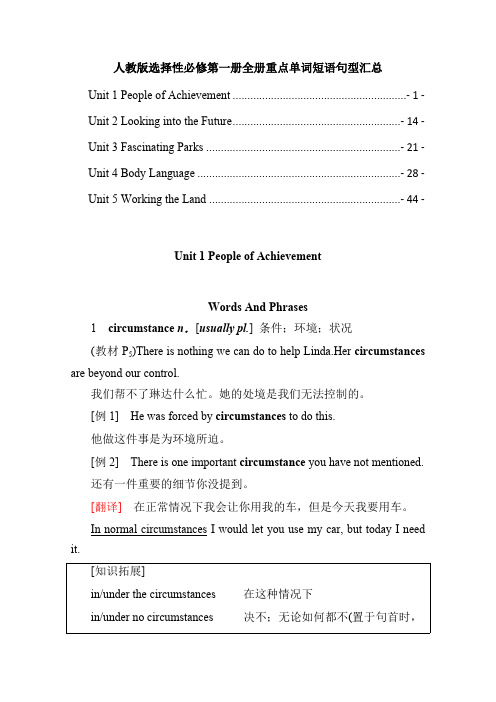
人教版选择性必修第一册全册重点单词短语句型汇总Unit 1 People of Achievement...........................................................- 1 -Unit 2 Looking into the Future.........................................................- 14 -Unit 3 Fascinating Parks..................................................................- 21 -Unit 4 Body Language.....................................................................- 28 -Unit 5 Working the Land.................................................................- 44 -Unit 1 People of AchievementWords And Phrases1 circumstance n.[usually pl.]条件;环境;状况(教材P5)There is nothing we can do to help Linda.Her circumstances are beyond our control.我们帮不了琳达什么忙。
她的处境是我们无法控制的。
[例1] He was forced by circumstances to do this.他做这件事是为环境所迫。
[例2] There is one important circumstance you have not mentioned.还有一件重要的细节你没提到。
高考句型翻译120句(keys)
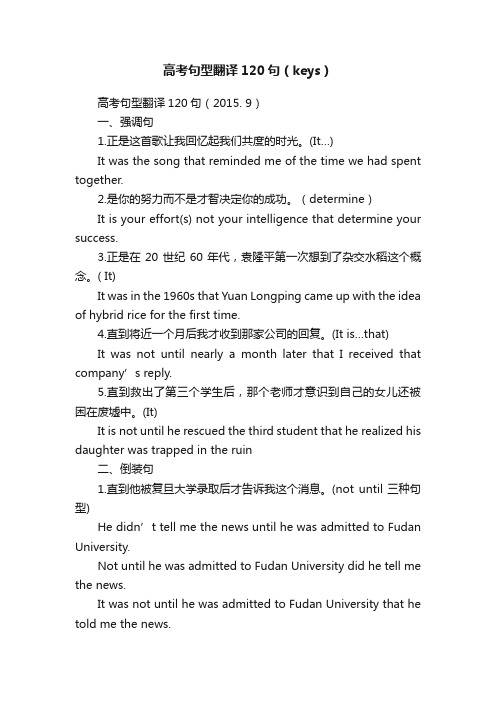
高考句型翻译120句(keys)高考句型翻译120句(2015. 9)一、强调句1.正是这首歌让我回忆起我们共度的时光。
(It…)It was the song that reminded me of the time we had spent together.2.是你的努力而不是才智决定你的成功。
(determine)It is your effort(s) not your intelligence that determine your success.3.正是在20世纪60年代,袁隆平第一次想到了杂交水稻这个概念。
( It)It was in the 1960s that Yuan Longping came up with the idea of hybrid rice for the first time.4.直到将近一个月后我才收到那家公司的回复。
(It is…that)It was not until nearly a month later that I received that company’s reply.5.直到救出了第三个学生后,那个老师才意识到自己的女儿还被困在废墟中。
(It)It is not until he rescued the third student that he realized his daughter was trapped in the ruin二、倒装句1.直到他被复旦大学录取后才告诉我这个消息。
(not until三种句型)He didn’t tell me the n ews until he was admitted to Fudan University.Not until he was admitted to Fudan University did he tell me the news.It was not until he was admitted to Fudan University that he told me the news.2.只有当我们完全理解生命的价值时我们才会珍惜幸福的每一刻并且帮助周围的人。
英语基本句型翻译练习
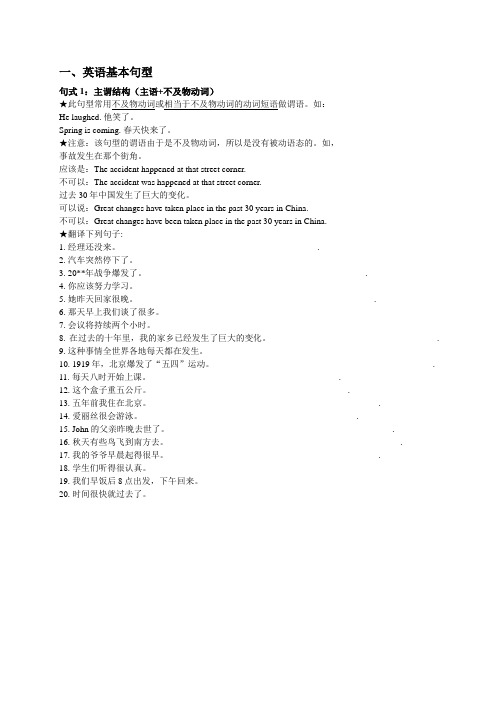
一、英语基本句型句式1:主谓结构(主语+不及物动词)★此句型常用不及物动词或相当于不及物动词的动词短语做谓语。
如:He laughed. 他笑了。
Spring is coming. 春天快来了。
★注意:该句型的谓语由于是不及物动词,所以是没有被动语态的。
如,事故发生在那个街角。
应该是:The accident happened at that street corner.不可以:The accident was happened at that street corner.过去30年中国发生了巨大的变化。
可以说:Great changes have taken place in the past 30 years in China.不可以:Great changes have been taken place in the past 30 years in China.★翻译下列句子:1. 经理还没来。
_____________________________________________.2. 汽车突然停下了。
________________________________________________3. 20**年战争爆发了。
__________________________________________________.4. 你应该努力学习。
_____________________________________________________5. 她昨天回家很晚。
______________________________________________________.6. 那天早上我们谈了很多。
___________________________________________________7. 会议将持续两个小时。
_____________________________________________________8. 在过去的十年里,我的家乡已经发生了巨大的变化。
Unit1-Unit3课文重点句型总结含翻译 牛津译林版七年级英语上册

7AU1-U3课文重点句型总结U11.What's your name?你叫什么名字?2.Are you my master?你是我的主人吗?3.Nice to meet you too.见到你也很高兴。
4.Hi ,l I'm Millie, a new student at Sunshine Middle School.l'm I2 years old.嗨,我叫米莉,是阳光中学的一名新生,今年12岁。
5.I often play football after school.放学后我经常踢足球。
6.He is from Nanjing.他来自南京。
7.He is good at Maths.他擅长数学。
lie has short hair.米莉有一头短发。
9.Look, Sandy is over there.She loves dancing.看,桑迪在那边。
她喜欢跳舞。
10.She has short hair.她留着短发。
11.She is good at swimming.她擅长游泳。
12.She does well in swimmmng.她游泳很好。
13.Glad to meet you.很高兴认识你。
14.Hello, everyone! I am Daniel. I am 12. I come from Nanjing,but now l live with my family in Beiing.大家好!我是丹尼尔。
我今年12岁。
我来自南京,但现在我和家人住在北京。
15.I am not tall My hair is very short, and I wear glasses.我不高。
我的头发很短,我戴着眼镜。
16.l like all the lessons at sunshine Midle school, and l am good at Maths.我喜欢阳光中学的所有课程,而且我的数学很好。
哈尔滨市第 69 中学 2022 级英语学科六年级上Unit3 知识清单-背诵版(1)

哈尔滨市第69中学2021级英语学科Unit 3My weekend plan 知识清单一、语音、重音1.二重单词:tonight adv.今晚tomorrow adv&n..明天together adv.一起2.易错一重:dictionary cn.字典postcard cn.明信片space n.太空price n.价格mooncake n.月饼3.语音:v i sit [i ]f i lm [i ]tr i p [i ]s u p er m ar ket [ju:][ə][a ː]e vening [i]t o night [ə]tomorr ow [əʊ]d i ction a ry [ɪ][ə]c o mic [ɒ]w or d [ɜ:]p o stc ar d [əʊ][ɑ:]l e sson [e ]sp a ce:[eɪ]tr a vel [æ]h a lf [ɑ:]pr i ce [aɪ]toge th er [ð]m oo ncake [uː]p o e m [əʊ][ɪ]二、重点短语1.寻找look for2.一些美丽的叶some beautiful leaves3.看电影see/watch a film4.在这周末this weekend5.画画draw (some )pictures6.他最喜欢的漫画书his favourite comic book7.上美术课have an art lesson8.去旅行take a trip9.堆雪人make a snowman10.听起来棒极了!Sounds great!11.去超市go to the supermarket12.拜访我的祖父母visit my grandparents13.去游泳go swimming14.去滑冰goice-skating 班级:______姓名:______学号:______15.洗衣服wash clothes16.去野餐go for a picnic17.玩的高兴!Have a good time!18.在他回家的路上on his way home19.去电影院go to the cinema20.看一场关于太空之旅的电影see a film about space travel.21.许多a lot of/lots of22.下周三next Wednesday23.在周二on Tuesday24.半价half price.25.一些单词书some word books26.在这些日子里on these days27.中秋节Mid-Autumn Festival28.聚会get together29.吃大餐have a big dinner30.做月饼make mooncakes31.读一首诗read a poem32.害怕水be afraid of water33.在这写下你的计划write down your plan here34.学习如何游泳learn how to swim35.做中学Learn by doing三、重点句型1.你明天打算做什么?What are you going to do tomorrow?2.我打算上美术课。
- 1、下载文档前请自行甄别文档内容的完整性,平台不提供额外的编辑、内容补充、找答案等附加服务。
- 2、"仅部分预览"的文档,不可在线预览部分如存在完整性等问题,可反馈申请退款(可完整预览的文档不适用该条件!)。
- 3、如文档侵犯您的权益,请联系客服反馈,我们会尽快为您处理(人工客服工作时间:9:00-18:30)。
Starter units 1--3重点句型
1、早上好,爱丽丝!
2、下午好!
3、晚上好!
4、你好吗?(并回答)
5、你到你很高兴(4个并做答)
6、这个用英语怎么说?
7、那个用英语怎么说?
8、它是一个橙子。
9、请拼写它。
10、请不要拼写它。
11、这是一本英语书12、—你叫什么名字?
—我叫李磊(三个)。
13、—它是什么颜色的?
—它是绿色的。
14、这是一把红色的尺子。
15、这床被子是黑白相间的。
16、我会用英语说。
17、那是一个紫色的杯子。
18、—你是海伦吗?
—是的,我是。
\不,我不是
19、—她叫什么名字?
—她是简。
(2个)
20、—他是杰克吗?
—是的,他是
—不,他不是。
21、—你的电话号码是多少?
—321-9087
22、—你的姓是什么?
—史密斯
23、—她的名是什么?
—吉娜
24、我的朋友在中国。
25.她的电话号码是245-2314
26、—7加2是多少?
—是9. 27、她是张娜吗?
28、我在朝阳中学。
29、我姓张。
30、地图是蓝色的。
31、地图是蓝色的吗?
32、这是李磊的橡皮。
33、形容词性物主代词有哪些?
34、四加五等于九。
35、这是你的号码吗?。
